Bringing a new puppy into your home is an exciting time, filled with joy and adorable moments. However, just like human babies, puppies are incredibly vulnerable and require special care, especially when it comes to their diet. Many common household foods that are perfectly safe for humans—and even adult dogs—can be extremely harmful, or even fatal, to a developing puppy. Understanding “What Food Is Bad For Puppies” is paramount for any responsible pet owner to ensure their little companion grows up healthy and strong.
Puppies have less developed digestive and immune systems compared to adult dogs, making them particularly susceptible to food toxicities and digestive upsets. Their smaller body weight also means that even tiny amounts of certain substances can have a more concentrated and dangerous effect. Pet poisonings are a significant concern, with hundreds of thousands occurring annually, and common household foods are a major contributor. Equipping yourself with the knowledge of what your puppy absolutely cannot eat, alongside what they can safely enjoy, is the best way to safeguard their well-being. This guide will serve as your essential resource to navigate the world of puppy nutrition and help you keep your new family member happy and healthy. For a broader understanding of what dogs can consume, consider exploring what can dogs eat and drink.
Why Certain Foods Are Toxic to Dogs and Puppies
The canine digestive system and metabolism differ significantly from ours, which is why humans can safely consume many foods that are detrimental to dogs, especially puppies. Dogs’ bodies process certain substances in unique ways. For instance, the theobromine and caffeine found in chocolate are metabolized much slower by dogs than by humans. This slow processing means these substances can rapidly accumulate in a puppy’s system, potentially leading to severe illness or even death.
Similarly, while the fleshy parts of fruits like cherries might be digestible for humans, the cyanide present in their pits, stems, and leaves can pose a threat if consumed in large quantities. For puppies, even smaller amounts can be problematic due to their developing systems. Additionally, fruit pits are difficult for puppies to digest and can cause choking or gastrointestinal obstructions, leading to severe discomfort and diarrhea.
Food toxicity isn’t a one-size-fits-all issue; it can vary based on a dog’s size, breed, and overall health. For puppies, these variations are even more critical. Their smaller size and immature organs mean they have a lower tolerance for toxins. This underscores the importance of consulting your veterinarian if you have any questions or concerns about foods your puppy might have ingested or should avoid. Their expertise is invaluable in navigating the complexities of puppy nutrition and safety.
List of Common Foods Puppies Cannot Eat
Many everyday household foods are not only dangerous but often toxic to puppies. It’s crucial for puppy owners to be aware of these items to prevent accidental ingestion. While the following list is comprehensive, it’s not exhaustive, so always err on the side of caution.
1. Alcohol
Due to their smaller size and developing organs, puppies are incredibly vulnerable to alcohol poisoning. Even minute amounts can have deadly effects. Alcohol acts as a depressant on the central nervous system, and symptoms in puppies can quickly escalate from vomiting and diarrhea to breathing difficulties, tremors, loss of coordination, coma, and even death. It’s vital to keep all alcoholic beverages and products containing alcohol completely out of a puppy’s reach.
2. Apple, Apricot, Cherry, and Plum Seeds/Pits
While the fleshy part of an apple (without the core) is safe for dogs, the core and apple seeds contain cyanide. Although small amounts might not immediately cause severe harm, it’s always best to avoid them altogether, especially for puppies. Apple cores can also be a choking hazard. Similarly, the pits from apricots, cherries, peaches, and plums are highly dangerous. These pits not only contain cyanide, which can inhibit red blood cells from carrying oxygen, but they also pose a significant choking risk and can cause gastrointestinal obstruction in puppies. Symptoms of cyanide poisoning include vomiting, irregular heartbeats, seizures, and coma.
3. Avocado
Avocados contain a substance called persin, which can be toxic to some animals. While its effects on dogs are debated, it’s known to cause issues in other mammal species. For puppies, it’s best to avoid avocados entirely. More critically, the large pit of an avocado presents a severe choking hazard and can cause a life-threatening gastrointestinal obstruction if swallowed by a curious puppy.
 Avocado
Avocado
4. Broccoli
Broccoli contains isothiocyanates, which can be harmful to pets in very large doses. While an occasional small piece might be tolerated by an adult dog, it’s generally best to avoid feeding broccoli to puppies given their sensitive digestive systems. The stalks can also pose a choking risk or get lodged in a puppy’s throat, causing an obstruction.
5. Caffeine and Coffee Grounds
Caffeine contains methylxanthines, which are highly toxic to puppies. Even small amounts can lead to severe and potentially fatal symptoms, including hyperactivity, vomiting, diarrhea, tremors, seizures, and an irregular or racing heartbeat. This applies to coffee grounds, tea bags, soda, energy drinks, and even some medications. Keep all caffeine-containing products securely out of your puppy’s reach.
6. Chicken & Turkey Skin, Ham, & Other Fatty Cuts of Meat
Fatty meats, including chicken and turkey skin, ham, and rich cuts of beef or pork, are extremely bad for puppies. Their high-fat content can trigger acute pancreatitis, a painful and potentially life-threatening inflammation of the pancreas. Pancreatitis can lead to severe vomiting, diarrhea, abdominal pain, and dehydration. Additionally, cooked bones from chicken or turkey are brittle and can splinter, causing internal damage, obstructions, or perforations in a puppy’s digestive tract, which can be fatal.
7. Chocolate
Chocolate is one of the most well-known toxic foods for dogs and is particularly dangerous for puppies. It contains theobromine and caffeine (methylxanthines), which puppies cannot metabolize efficiently. The darker the chocolate, the higher the concentration of these toxic compounds. Some sugar-free chocolates also contain xylitol, an artificial sweetener that is lethally toxic to dogs.
Symptoms of chocolate poisoning can include hyperactivity, vomiting, diarrhea, increased thirst, panting, tremors, seizures, and abnormal heart rhythms. In severe cases, it can lead to internal bleeding, heart attack, and death. If your puppy ingests any amount of chocolate, regardless of how small, contact your veterinarian immediately.
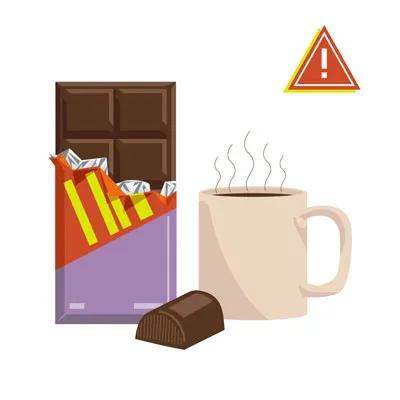 Chocolate
Chocolate
8. Grapes and Raisins
Grapes and raisins are incredibly dangerous for puppies and dogs of all ages. Even a small number can cause sudden kidney failure. The toxic component is tartaric acid, which can severely damage a puppy’s kidneys. Symptoms of grape or raisin poisoning include vomiting, diarrhea, lethargy, loss of appetite, abdominal pain, and changes in urination (either increased thirst and urination early on, or complete lack of urine production in later stages of kidney failure). This is an emergency situation, and veterinary attention is needed immediately.
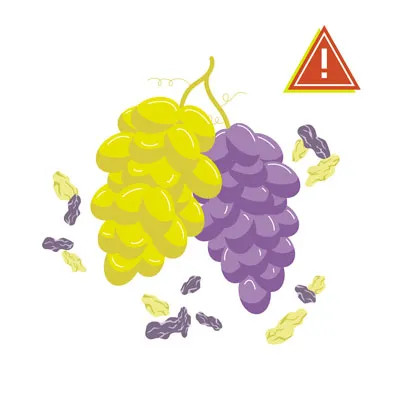 Grapes & Raisins
Grapes & Raisins
9. Macadamia Nuts, Almonds, and Pistachios
Macadamia nuts are highly toxic to dogs, causing symptoms like weakness, tremors, vomiting, fever, and depression. Even a small amount, such as six nuts, can cause severe poisoning in a small puppy. While the exact mechanism of toxicity isn’t fully understood, they should be strictly avoided. Other nuts like almonds and pistachios are also problematic; they are high in fat, which can lead to pancreatitis, and also pose a significant choking hazard, especially for puppies. Furthermore, many flavored or spiced nuts contain additional ingredients toxic to dogs.
10. Milk and Dairy Products
While some adult dogs can tolerate small amounts of dairy, many dogs, and especially puppies, are lactose intolerant. Their digestive systems may lack sufficient lactase, the enzyme needed to break down lactose in milk. Consuming milk or dairy products can lead to digestive upset, including diarrhea, gas, and abdominal pain. Ice cream is particularly bad due to its high sugar and fat content. Small amounts of low-fat cheese might be okay for some adult dogs as a treat, but for puppies, it’s generally best to avoid dairy altogether to prevent digestive issues.
11. Mushrooms
It’s safest to assume that any mushroom found outside is potentially toxic to your puppy. Wild mushrooms can contain a variety of toxins that may cause liver and kidney failure, vomiting, diarrhea, hallucinations, or damage to red blood cells. While some store-bought white button mushrooms might be considered safe after thorough washing and cooking, it’s much safer to avoid them entirely for puppies and opt for clearly safe treats instead.
12. Nutmeg and Cinnamon
Nutmeg contains myristicin, a compound that can cause hallucinations, disorientation, and severe vomiting in dogs. The effects are more pronounced in smaller dogs and puppies or when consumed in higher doses. It’s crucial to keep any foods containing nutmeg out of your puppy’s reach. Cinnamon, while not typically toxic, can irritate a puppy’s mouth and digestive tract. In larger amounts, it can also lead to a dangerous drop in blood sugar, posing serious health risks.
13. Onions, Garlic, Chives, and Leeks
All members of the allium family—onions, garlic, chives, and leeks—are highly toxic to puppies and dogs. These plants contain sulfoxides and disulfides, which can damage a puppy’s red blood cells, leading to hemolytic anemia. Symptoms include weakness, lethargy, pale gums, rapid breathing, vomiting, and diarrhea. Garlic is five times more potent than onions. Onion and garlic powders are often found in prepared foods, including baby food, so always check labels. Certain Japanese breeds, like Akitas and Shiba Inus, are particularly sensitive, but these plants are dangerous for all dogs and especially vulnerable puppies.
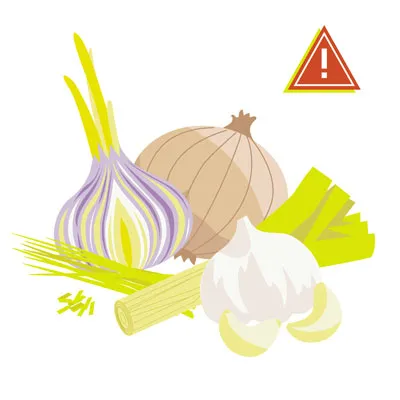 Onions, Garlic, Chives, & Leeks
Onions, Garlic, Chives, & Leeks
14. Salt
Excessive salt intake can be very dangerous for puppies. Too much salt can lead to sodium ion poisoning, which can cause vomiting, diarrhea, lethargy, excessive thirst, tremors, seizures, and even coma. This risk extends beyond salty human snacks like potato chips to items like rock salt, homemade play dough, or even large amounts of salt in cooked foods. Always ensure your puppy has access to fresh water and avoid giving them salty treats.
15. Spicy Food
Spicy foods are not only unpleasant but can also be harmful to a puppy’s sensitive digestive system. Ingredients like chili powder or hot peppers can cause severe gastrointestinal upset, leading to vomiting, diarrhea, and stomach pain. In some cases, it can even cause stomach ulcers. Keep all spicy foods far away from your puppy.
16. Sugar-Free Gum and Candy (Xylitol)
Xylitol is an artificial sweetener commonly found in sugar-free gum, candies, baked goods, toothpaste, and some peanut butters. It is profoundly toxic to puppies. Ingesting xylitol causes a rapid and severe drop in blood sugar (hypoglycemia), leading to symptoms like weakness, lethargy, vomiting, loss of coordination, and seizures. In some cases, it can also cause liver failure, which can be fatal. The amount of xylitol in just a few pieces of gum can be lethal to a medium-sized dog, making it even more dangerous for small puppies. Always check ingredient labels carefully before giving your puppy any human food or treats, especially peanut butter.
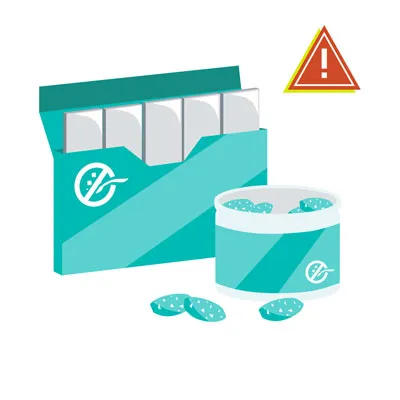 Sugar-Free Gum & Candy (Xylitol)
Sugar-Free Gum & Candy (Xylitol)
17. Tomatoes and Raw Potatoes
The ripened red fruit of a tomato is generally considered safe for dogs in moderation. However, the green parts of the tomato plant—leaves, stems, and unripe green tomatoes—contain solanine, a toxic compound. Solanine can cause severe gastrointestinal upset, lethargy, weakness, and loss of coordination in puppies.
Similarly, cooked potatoes (plain, without additives) are generally safe in small amounts. But raw potatoes also contain solanine, especially when green or sprouting. Therefore, raw potatoes should never be fed to puppies. Always cook potatoes thoroughly and remove any green parts or sprouts before offering a small, plain piece to an adult dog, and generally avoid for puppies due to their sensitive digestion.
18. Tobacco
Tobacco products in any form (cigarettes, cigars, chewing tobacco, e-liquids, nicotine patches) are extremely dangerous and toxic for puppies. Nicotine poisoning can occur rapidly and is often fatal. Symptoms include vomiting, diarrhea, drooling, agitation, rapid heart rate, tremors, weakness, seizures, and respiratory arrest. Puppies are naturally curious and might chew on discarded cigarette butts, so vigilance is essential. If your puppy ingests any tobacco product, seek immediate veterinary emergency care.
19. Yeast and Raw Dough
Yeast and raw dough are a double threat to puppies. Firstly, raw dough can expand significantly in a puppy’s warm, moist stomach, causing severe bloating, pain, and potentially life-threatening gastric dilatation-volvulus (GDV), or bloat, where the stomach twists. This requires immediate emergency surgery. Secondly, the yeast and sugar in raw dough ferment, producing alcohol. This can lead to alcohol toxicity, which, as previously mentioned, is extremely dangerous and can be fatal for puppies. Never allow your puppy access to raw dough.
20. Raw Meat
Feeding raw or undercooked meat to puppies is highly risky and generally not recommended. Raw meat can harbor dangerous bacteria like Salmonella and E. coli, which can cause severe gastrointestinal illness, not just in humans but also in puppies whose immune systems are still developing. While adult dogs might have stronger digestive acids to combat some bacteria, puppies are far more susceptible. Additionally, raw meat often contains small bones that can splinter, causing choking, internal injuries, or obstructions in a puppy’s digestive tract. It’s always safest to feed thoroughly cooked, boneless meat.
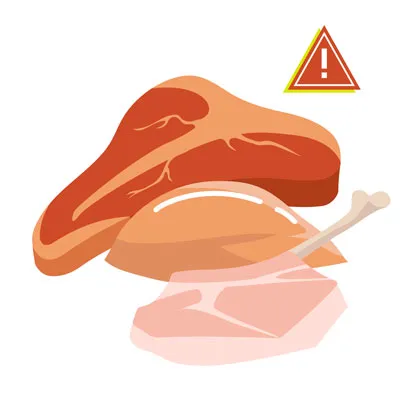 Raw Meat
Raw Meat
21. Rhubarb
Rhubarb is a plant commonly used in human desserts, but it is not safe for puppies or dogs. Its leaves contain soluble calcium oxalate crystals. If a puppy consumes enough of these crystals, they can bind with calcium in the body, leading to a dangerous drop in calcium levels and potentially causing acute renal (kidney) failure. Symptoms can include tremors, weakness, drooling, bloody urine, changes in thirst and urination, and vomiting.
22. Star Fruit
Similar to rhubarb, star fruit also contains soluble calcium oxalate crystals. For the same reasons, it should not be given to puppies. Ingestion can lead to kidney issues and other serious health problems due to the alteration of calcium levels in their system.
23. Flavored Water and Seltzer Water
It is always best to provide your puppy with plain, fresh, clean water. Flavored and seltzer waters often contain added ingredients that can be harmful, such as sugar, artificial sweeteners (like xylitol), or excessive salt. Plain seltzer water, even without additives, can cause gas and bloating in a puppy’s sensitive stomach. Sticking to regular water is the safest and healthiest choice for hydration.
Foods Safe for Puppies (in Moderation)
While the list of foods to avoid is extensive, there are also many human foods that are safe and can be beneficial for puppies in appropriate quantities. However, always introduce new foods slowly and in very small amounts to monitor for any adverse reactions, and remember that treats should never make up more than 10% of a puppy’s daily caloric intake. For more information on a balanced diet, check out what should you feed a dog.
1. Apples, Oranges, and Bananas
- Apples: The fleshy part of apples (without the core and seeds) is fine for puppies. Always remove the core and seeds due to cyanide content and choking hazards. Cut into small, manageable pieces.
- Oranges: Small amounts of peeled, seedless oranges can be a good source of Vitamin C. However, their high acidity might upset some sensitive puppy stomachs.
- Bananas: In moderation, peeled bananas can be a healthy, potassium-rich treat. They are easy to digest for most puppies.
2. Blueberries and Blackberries
These berries are excellent sources of antioxidants, fiber, phytochemicals, and Vitamin C. They make a great, healthy treat for puppies in small quantities.
3. Cantaloupe, Mango, Peaches, Pears, Pineapples, and Watermelons
Many fruits are safe for puppies once prepared correctly:
- Cantaloupe: A good source of vitamins and hydration.
- Watermelon: Remove all rinds and seeds (including the pale seeds in “seedless” varieties) to prevent choking and digestive upset. It’s a hydrating treat, especially on warm days.
- Mangoes, Peaches, Pears, Pineapples: Always remove the skin, seeds, pits, and cores before offering small, bite-sized pieces. Pits contain cyanide and are choking hazards.
For more details on fruits, you might find it helpful to read what fruits are not good for dogs and what fruits should not be given to dogs.
4. Carrots, Cucumber, and Celery
These “three C’s” are fantastic low-calorie, high-fiber snacks for puppies:
- Carrots: Great for dental health and packed with vitamins. Cut into small, crunchy pieces.
- Cucumbers: Mostly water, offering hydration and vitamins with very few calories.
- Celery: Another crunchy option that can help with bad breath. Cut into small pieces.
5. Cheese
Very small amounts of low-fat cheese can be given as an occasional treat, but only if you are certain your puppy is not lactose intolerant. High-fat cheeses should be avoided due to the risk of pancreatitis. Monitor your puppy for any signs of digestive upset after consumption.
6. Eggs
Fully cooked eggs (scrambled or hard-boiled, plain) are an excellent source of protein and can be very soothing for an upset stomach. Ensure they are cooked thoroughly to eliminate the risk of Salmonella.
7. Peanuts, Peanut Butter, and Cashews
- Peanuts and Cashews: Unsalted, unflavored, and unseasoned varieties are safe in small quantities. Due to their high-fat content, offer them sparingly to avoid pancreatitis.
- Peanut Butter: A popular treat, but crucially, always choose unsalted, natural peanut butter with no added sugar and absolutely no xylitol, which is highly toxic to dogs. Use in moderation due to calorie density.
8. Popcorn and Corn
- Popcorn: Air-popped, unsalted, and unbuttered popcorn can be a fun treat. Ensure all unpopped kernels are removed to prevent choking or dental damage.
- Corn: Corn kernels (removed from the cob) are safe when served plain, without butter, salt, or spices. Avoid corn on the cob as the cob can cause severe intestinal obstruction.
9. Coconut and Honey
- Coconut: Small amounts of fresh coconut (without the furry shell, which is a choking hazard), coconut milk, or coconut oil can be beneficial, potentially aiding with allergies due to lauric acid. However, some puppies may experience digestive upset. Avoid coconut water due to high potassium.
- Honey: In moderation, honey is safe and contains vitamins and minerals.
10. Shrimp and Fish
- Shrimp: Plain, fully cooked shrimp with the shell, head, tail, and legs removed is a great protein source. Avoid any seasoned or buttered varieties.
- Fish: Plain, fully cooked, and boneless fish like salmon or sardines can be given in moderation (no more than twice a week). Canned tuna packed in water (not oil), also plain, is acceptable sparingly to avoid excess mercury and salt.
11. Turkey
Cooked turkey meat, without skin, fat, or bones, is a healthy and safe source of protein for puppies. Offer small, plain bites. Always avoid seasoned or salted turkey, and never give cooked bones. For insights into meat, refer to what is the one meat that dogs should never eat.
12. Grains, Wheat, and Quinoa
In moderation, grains like wheat and corn are generally fine for puppies unless they have a known allergy. Quinoa is a healthier option compared to many other fillers. Monitor for any allergic reactions like itching or digestive issues when introducing grains.
13. Green Beans
Green beans are a safe, tasty, and healthy snack for puppies. They can be served raw, steamed, or from a can (plain, no added salt or spices). Cut them into small, bite-sized pieces to prevent choking.
What Dogs Are Most at Risk if They Consume Toxic Foods?
While all dogs are at risk from toxic foods, certain groups are particularly vulnerable, and this is especially true when considering what food is bad for puppies.
- Small Breeds vs. Large Breeds: Smaller dogs have a lower body weight, meaning that a smaller amount of a toxic substance can lead to a higher concentration in their system, making them more susceptible to severe poisoning compared to larger breeds. This is a critical factor for substances like chocolate.
- Puppies: Young dogs, by far, are at the highest risk. Their digestive systems are still developing and are more sensitive to upsets. Their immune systems are also less mature, making them more vulnerable to pathogens that might be present in raw foods. Furthermore, their inquisitive nature often leads them to explore and ingest things they shouldn’t.
- Elderly Dogs: Older dogs may have compromised organ function or other underlying health conditions, which can increase their risk if they consume toxic foods.
- Dogs with Pre-Existing Conditions: Dogs suffering from illnesses like diabetes, kidney disease, or liver conditions are also at greater risk. Their bodies may not be able to process or eliminate toxins as effectively, leading to more severe reactions.
How To Prevent Puppies from Eating Toxic Foods
Accidents happen, but proactive measures can significantly reduce the risk of your beloved puppy getting into unsafe human food.
1. Store Foods Out of Reach
The most effective prevention is to ensure toxic foods are completely inaccessible. Keep dangerous items on high shelves that your puppy cannot reach, or securely locked away in cabinets. Remember that puppies are ingenious and can often get into places you wouldn’t expect.
2. Avoid Feeding Puppies from Your Plate
Resist the urge to feed your puppy scraps from your plate or while you are cooking in the kitchen. This habit encourages begging and teaches your puppy that human food is fair game, increasing the likelihood they will try to snatch forbidden items. It’s safest to only give treats specifically formulated for dogs.
3. Educate Family Members and Guests
Ensure everyone in your household, including children and visitors, understands the dangers of human foods for puppies. Clearly communicate that no human food, no matter how tempting, should be given to your puppy without your explicit approval.
4. Be Careful During Holidays
Holidays and celebrations often involve an abundance of human food, which can lead to increased risks. During these busy times, it’s easy to let your guard down. Be extra cautious: dispose of food waste immediately, keep serving dishes away from curious paws, and consider placing your puppy in a safe, separate area if you cannot supervise them closely. Have emergency contact information readily available for your veterinarian or pet poison control.
What To Do if Your Puppy Eats Something Toxic
If your puppy consumes something toxic, immediate action is crucial. Time is often of the essence, and prompt veterinary care can make a significant difference in the outcome.
Recognize the Symptoms: Be familiar with the signs of food toxicity, which can vary depending on the substance ingested. Common symptoms include listlessness, distress, pain, vomiting, diarrhea (which may be bloody), excessive drooling, weakness, tremors, seizures, difficulty breathing, hyperactivity, or a bloated, hard-to-the-touch stomach.
Take Immediate Action:
- Contact Your Veterinarian or Poison Control Right Away: Do not wait to see if symptoms develop or worsen. Call your vet or a pet poison control hotline (like the ASPCA Animal Poison Control Center or Pet Poison Helpline) immediately.
- Gather Information: Be prepared to provide critical details:
- Type of food eaten: Be as specific as possible (e.g., milk chocolate, sugar-free gum with xylitol).
- Amount consumed: Estimate as accurately as you can (e.g., 2 squares of chocolate, 3 grapes).
- Time of ingestion: When did your puppy eat it?
- Your puppy’s weight and age.
- Any symptoms currently observed.
- Avoid Home Remedies: Unless specifically instructed by your veterinarian or poison control, do not attempt home remedies like inducing vomiting. Some substances can cause further harm if vomited, and inducing vomiting incorrectly can be dangerous. Follow professional advice precisely.
Conclusion
Understanding what food is bad for puppies is a fundamental responsibility for every new pet parent. While the list of potentially harmful human foods may seem daunting, equipping yourself with this knowledge is the best defense against accidental poisoning. Puppies are particularly vulnerable due to their small size, developing systems, and inquisitive nature, making vigilance and preventive measures paramount.
Always store toxic foods out of reach, educate your family, and avoid feeding your puppy from the table. Remember that a puppy’s diet should primarily consist of high-quality, vet-approved puppy food, with any treats given sparingly and only from the list of safe foods. When in doubt, consult your veterinarian, who can offer tailored advice for your puppy’s specific needs. By staying informed and proactive, you can ensure your furry companion enjoys a long, healthy, and happy life, free from the dangers of inappropriate foods. Your puppy’s well-being depends on your careful choices and watchful eye.
Sources/Citations
- “Top 10 dog poisons,” Hilary Parker (5/2023), WebMD, https://www.webmd.com/pets/dogs/top-10-dog-poisons
- “What happens if a dog eats chocolate?” (10/2023), Colorado State University, https://vetmedbiosci.colostate.edu/vth/animal-health/why-is-chocolate-bad-for-dogs/
- “Fruits and vegetables dogs can or can’t eat,” (3/2024), American Kennel Club, https://www.akc.org/expert-advice/nutrition/fruits-vegetables-dogs-can-and-cant-eat/
- “What to do if your dog drinks alcohol,” Jerry Klein (7/2023), American Kennel Club, https://www.akc.org/expert-advice/vets-corner/is-alcohol-dangerous-for-dogs/
- “Can dogs eat apples?” Hector Joy (12/2022), PetMD, https://www.petmd.com/dog/general-health/can-dogs-eat-apples
- “Can dogs eat plums?” Katie Koschalk (7/2023), Chewy, https://be.chewy.com/nutrition-pet-diet-tips-can-dogs-eat-plums/
- “Avocado (Persea spp) Toxicosis in Animals,” Cristine Hayes (9/2024), Merck Veterinary Manual, https://www.merckvetmanual.com/toxicology/food-hazards/avocado-persea-spp-toxicosis-in-animals
- “People foods to avoid feeding your pets,” (n.d.), ASPCA, https://www.aspca.org/pet-care/animal-poison-control/people-foods-avoid-feeding-your-pets
- “People foods dogs can and can’t eat,” (3/2024), American Kennel Club, https://www.akc.org/expert-advice/nutrition/human-foods-dogs-can-and-cant-eat/
- “Can dogs eat nuts?” Amanda Ardente (1/2023), PetMD, https://www.petmd.com/dog/nutrition/can-dogs-eat-nuts
- “Can dogs drink milk?” Sandra C. Mitchell (1/2024), PetMD, https://www.petmd.com/dog/nutrition/can-dogs-drink-milk
- “Can dogs have nutmeg?” Barri J. Morrison (11/2023), PetMD, https://www.petmd.com/nutmeg-safe-dogs
- “Onion, garlic, chive, and leek poisoning in dogs,” Renee Schmid et al. (2024), VCA Animal Hospitals, https://vcahospitals.com/know-your-pet/onion-garlic-chive-and-leek-toxicity-in-dogs
- “Can dogs eat tomatoes?” Anna Burke (10/2024), American Kennel Club, https://www.akc.org/expert-advice/nutrition/can-dogs-eat-tomatoes/
- “Can dogs eat potatoes?” Katherine Ripley (11/2023), American Kennel Club, https://www.akc.org/expert-advice/nutrition/can-dogs-eat-potatoes/
- “What to do if your dog eats a cigarette butt,” (6/2023), American Kennel Club, https://www.akc.org/expert-advice/health/dog-ate-cigarette-butt/
- “Dough & dogs: Why it’s bad and what you can do,” Lisa Goldstein (7/2024), Preventive Vet, https://www.preventivevet.com/dogs/dough-is-toxic-to-dogs
- “Rhubarb,” (n.d.), Pet Poison Helpline, https://www.petpoisonhelpline.com/poison/rhubarb/
- “Can dogs drink carbonated water?” Heather Logue (n.d.), Rover, https://www.rover.com/blog/can-dogs-drink-carbonated-water/
- “What fruits can dogs eat?” Ellen Malmanger (2/2024), PetMD, https://www.petmd.com/dog/nutrition/what-fruits-can-dogs-eat
- “Can dogs have green beans?” Anna Burke (8/2022), American Kennel Club, https://www.akc.org/expert-advice/nutrition/can-dogs-have-green-beans/
- “About pet food safety,” (4/2024), CDC, https://www.cdc.gov/healthy-pets/about/pet-food-safety.html
